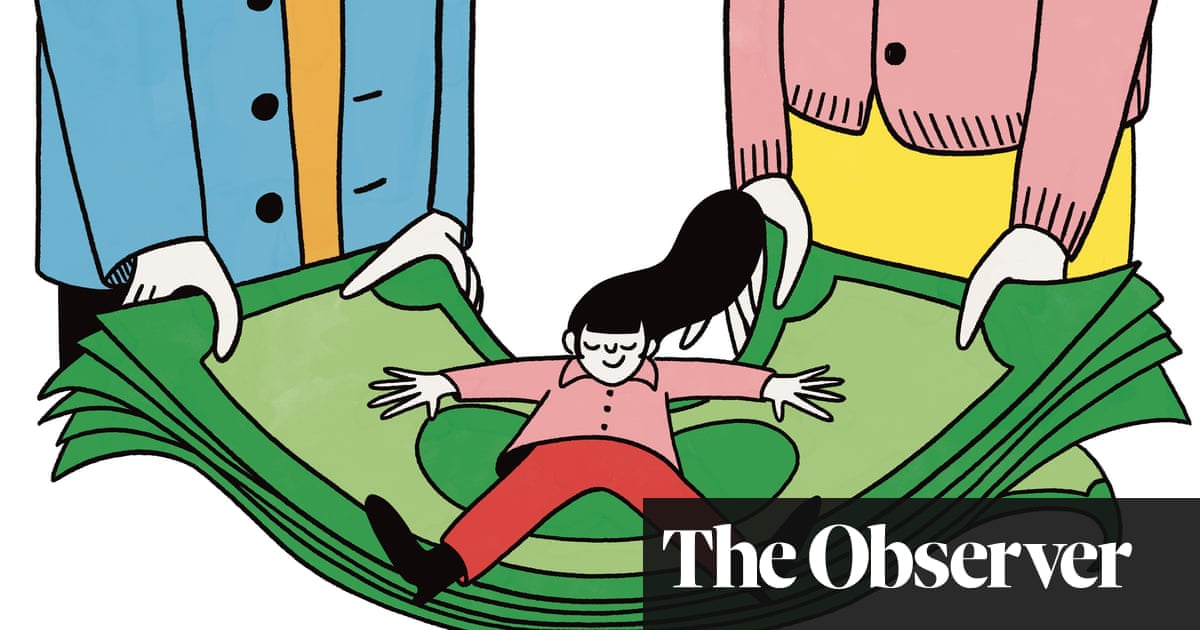- cross-posted to:
- [email protected]
- cross-posted to:
- [email protected]
You know the Bank of Mum and Dad when you see it: it’s your friend who seems broke, but always has a safety net, or who suddenly (but discreetly) acquires the deposit for a home. It’s those who stayed with their parents while they saved for a flat, or stuck it out in a profession they were passionate about even though the wages are chronically low. It’s those who do not need to consider the financial costs of having children. It’s those whose grandparents are covering nursery or university fees, with the Bank of Grandma and Grandad already driving an economic wedge between different cohorts in generations Alpha (born between 2010 and 2024) and Z (born in the late 1990s and early 2000s).
This is the picture we know, but the Bank of Mum and Dad is not just a luxury confined to the 1% – it is also evident in families like mine. I grew up in a working-class household and was the first person in my family to get a degree, but it was the fact my parents had scrimped in the 1980s to purchase properties in London (and allowed me to crash in one throughout my 20s) that has arguably been the true source of opportunities in my life.
In recent years, we have rightly widened the conversation about privilege in society. And yet how honest are we about one of the most obvious forces shaping anyone under 45: the presence or absence of a parental safety net? The truth is that we live in an inheritocracy. If you’ve grown up in the 21st century, your opportunities are increasingly determined by your access to the Bank of Mum and Dad, rather than by what you earn or learn. The economic roots of this story go back to the 1980s, but it accelerated after the 2008 financial crisis, as private wealth soared and wage growth stalled. In the 2020s, rather than a meritocracy – where hard work pays off – we have evolved into an inheritocracy, based on family wealth.



Maybe not the same jobs, but most people would. Human beings are wired to want to feel productive.
I don’t think we should be abolishing money or anything, and different jobs should pay different wages. Still, I think all people should have their basic needs met.
Yes I don’t disagree. But there is definitely a limit to what people will do voluntarily, especially if they don’t feel their effort is respected. Finding volunteers to read to kids is miles easier than volunteers to tidy up someone’s littered garden while that person boozily watches telly.
The Tragedy of the Commons is an old concept, very old. It far far far predates modern mega corps ravaging the planet. It is the simple observation that when people have free access to a shared resource they tend to mistreat it compared to their own property.
This is such a fundamental feature of humans that Aristotle was discussing it…
And that’s why the best comes from society when people have the freedom to better their lot visa their efforts (despite this causing inequality) so long as people’s basic needs are covered in a humane and reasonable way. But there will always be a difference between people. To eradicate that is to destroy the thing that motivates to go beyond merely what we’ll do voluntarily. And those (paid) jobs are still very vital to society functioning well. We have more than enough evidence that goodwill and volunteers is not sufficient to run a society at large. People are more nuanced than that.
Like I said, I think we should still have money. I just think the basic necessities should be guaranteed.
Nobody should have to do a job that’s horrible to them just because they need shelter and food.
If that horrible job needs someone, they need to offer enough money to be able to incentivize people to do it, and not just because the worker doesn’t want to starve or be homeless.
Yup sounds like we’re on the same page